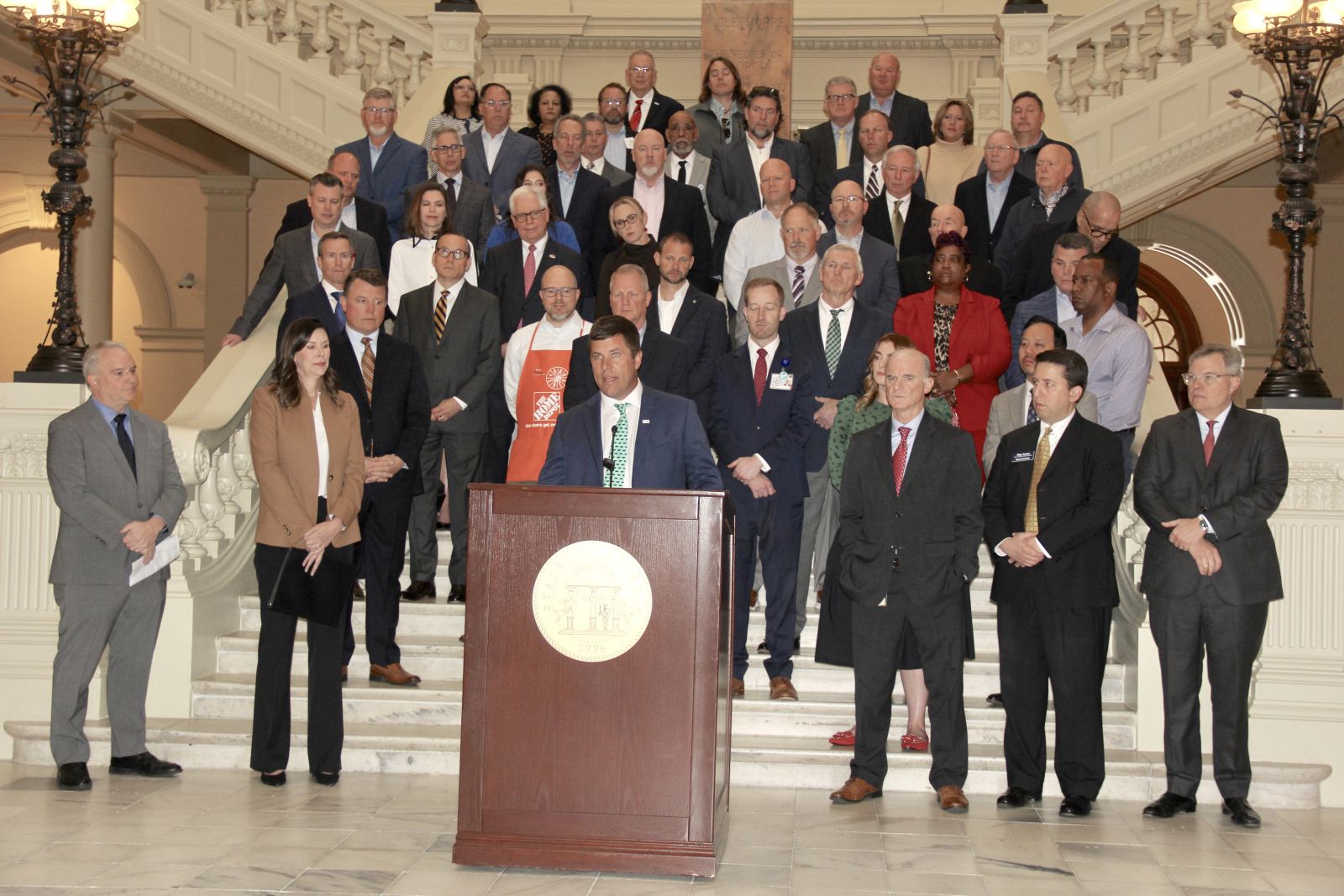blog-special
GFB Public Policy Update
by Adam Belflower
Posted on June 2, 2025 7:27 AM
2025 Legislative Session a Good One for Georgia Agriculture
The 2025 legislative session was successful for Georgia agriculture and shows our state leaders support the agriculture community. Because of action they took from January to April, Georgia continues to be a place farmers and ranchers can succeed.
Hurricane Recovery
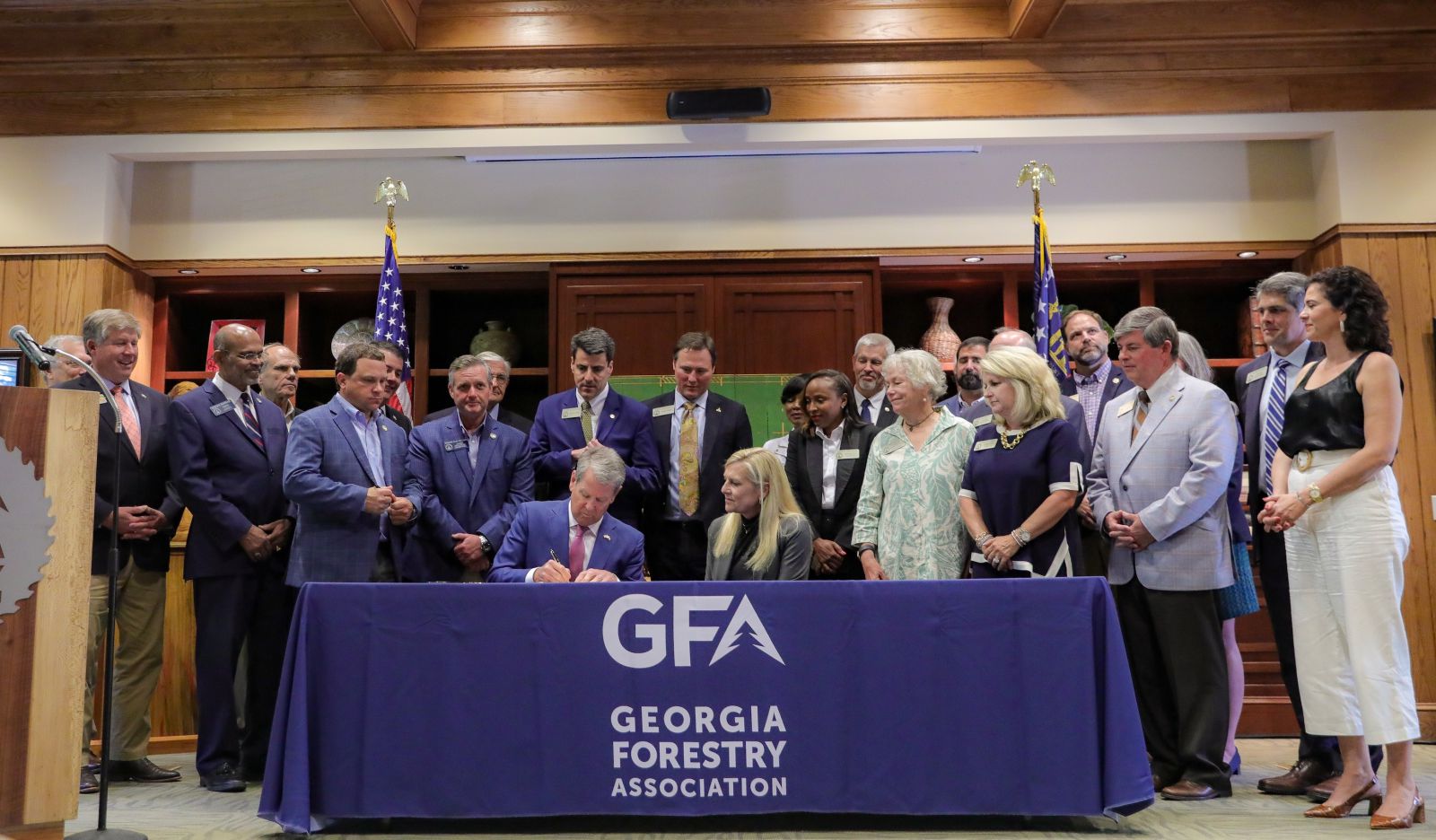
During a bill signing ceremony held at the Georgia Forestry Association in Forsyth on May 8, Gov. Brian Kemp signed House Bill 223, which provides multiple tax relief options to Georgia farmers and timber owners who suffered loss to Hurricane Helene. /Photo courtesy of Gov. Kemp's office
Supporting farmers, foresters, and rural communities impacted by Hurricane Helene was a top priority. House Bill (HB) 223, introduced by Rep. James Burchett, provides multiple tax relief options to those affected by the storm. This includes an exemption from the state income tax on federal disaster assistance and crop insurance payments received in 2025 due to Hurricane Helene; a reforestation tax credit for trees used in the commercial production of food and wood; and sales tax exemption for the replacement and repair of livestock buildings, poultry houses, and greenhouses in 2025.
The Amended Year 2025 budget also allocated funding for storm cleanup and recovery. Farm Bureau commends the General Assembly and Gov. Brian Kemp for helping farmers and timber owners recover as they grapple with generational losses.
Truck weights permanently increased
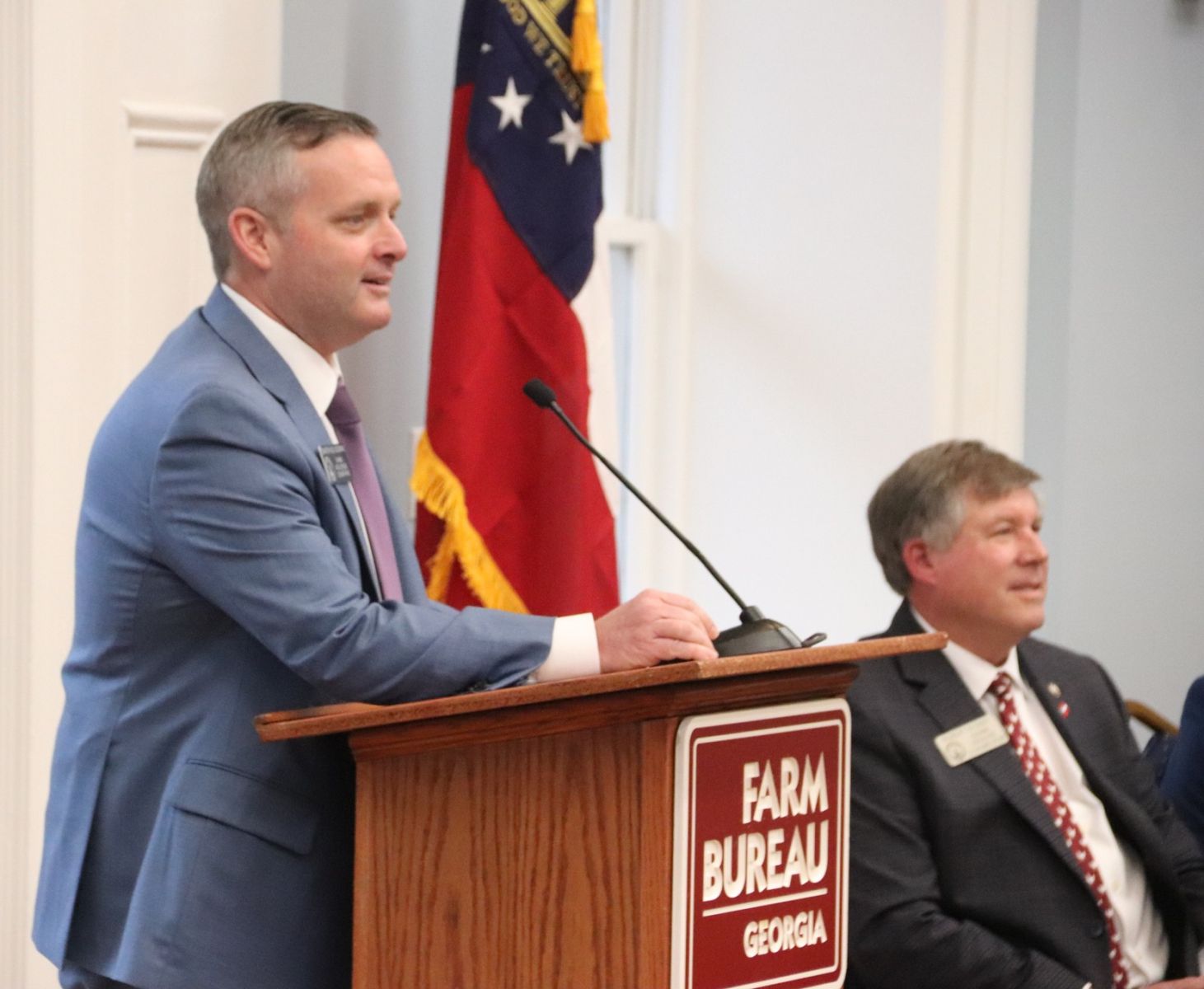
Sen. Ag Committee Chairman Russ Goodman, standing, & Ga. House Ag Committee Chairman Robert Dickey worked to get numerous ag bills passed this year./Photo by Jay Stone
Georgia farmers and foresters compete with neighboring states in global markets. It is important our producers have a level playing field to be competitive. HB 164 by Rep. Steven Meeks reduces transportation costs for producers by permanently increasing the gross vehicle weight variance from 5 to 10% for trucks hauling agriculture and forest products. This bill gives Georgia producers a level playing field by raising the allowable gross vehicle weight to 88,000 pounds.
Every state neighboring Georgia allows producers to haul with at least a 10% variance.
Tort reform
Barrow County farmer & GFB 4th Dist. Director Russ Wilburn spoke on behalf of Georgia farmers at a press conference March 13 in the Georgia Capitol supporting tort reform legislation./Photo by Jennifer Whittaker
Farmers and small business owners have grappled with Georgia’s legal climate for decades. Gov. Kemp committed to passing a tort reform package. Senate Bill (SB) 68 and SB 69, both introduced by Sen. John Kennedy, provide certainty and assurance for farmers fearful of frivolous lawsuits and outrageous jury verdicts.
If defendants find themselves in the courtroom, they will now be better positioned to display the facts of the case, leading to a fairer proceeding. We appreciate Cory Tyre, Bacon County Farm Bureau vice president, and Russ Wilburn, Barrow County Farm Bureau president, testifying at the Capitol on the importance of tort reform for farmers.
CUVA
Commonsense tax policy is a benefit farmers enjoy in our state. The Conservation Use Value Assessment (CUVA) program is pivotal in preserving Georgia’s farmland. HB 90 and House Resolution 32 by Rep. Chuck Efstration, along with HB 129 by Rep. Chas Cannon, address the changing dynamics of farm operations needing to become larger to be profitable.
These bills ensure family farms can continue to benefit from CUVA and that farmland remains in production. HB 90 and HR 32 increase the acreage cap from 2,000 to 4,000 acres. HB 129 will allow certain entities to lease land enrolled in CUVA.
Ag water metering
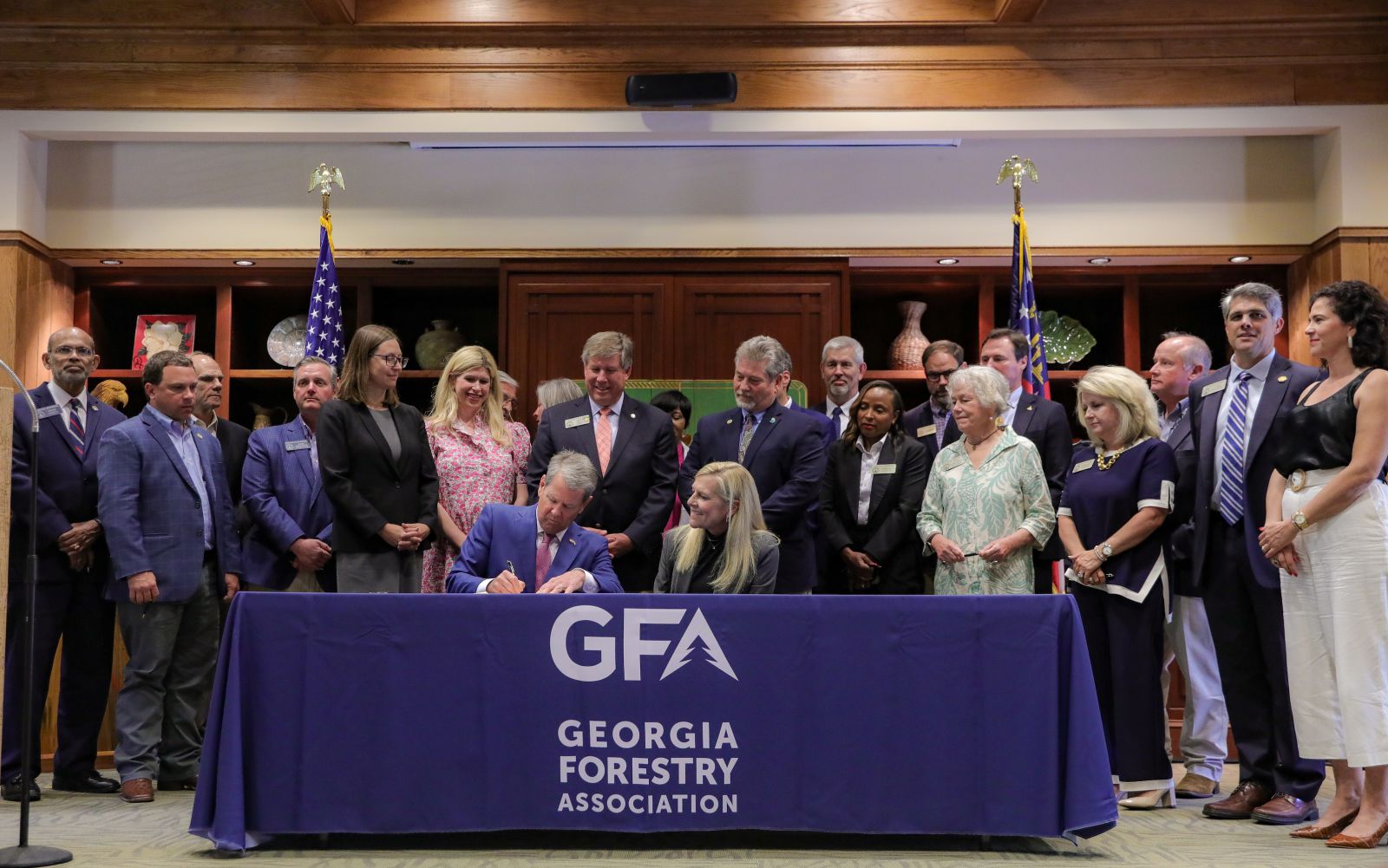
During a bill signing ceremony held at the Georgia Forestry Association in Forsyth on May 8, Gov. Brian Kemp signed House Bill 143, which improves Georgia's ag water metering program. / /Photo courtesy of Gov. Kemp's office
The Georgia Environmental Protection Division (EPD) continues to improve access to water resources for farmers. HB 143 by Rep. Robert Dickey improves Georgia’s ag water metering program and advances the work EPD has done in recent years. This bill will bring more irrigators into compliance, remove regulatory burdens on farmers, and save farmers and the state money.
As farmers plan to make decisions regarding their irrigation infrastructure, they should contact EPD to ensure they are compliant with the most recent permitting and metering requirements.
Crop protection labeling
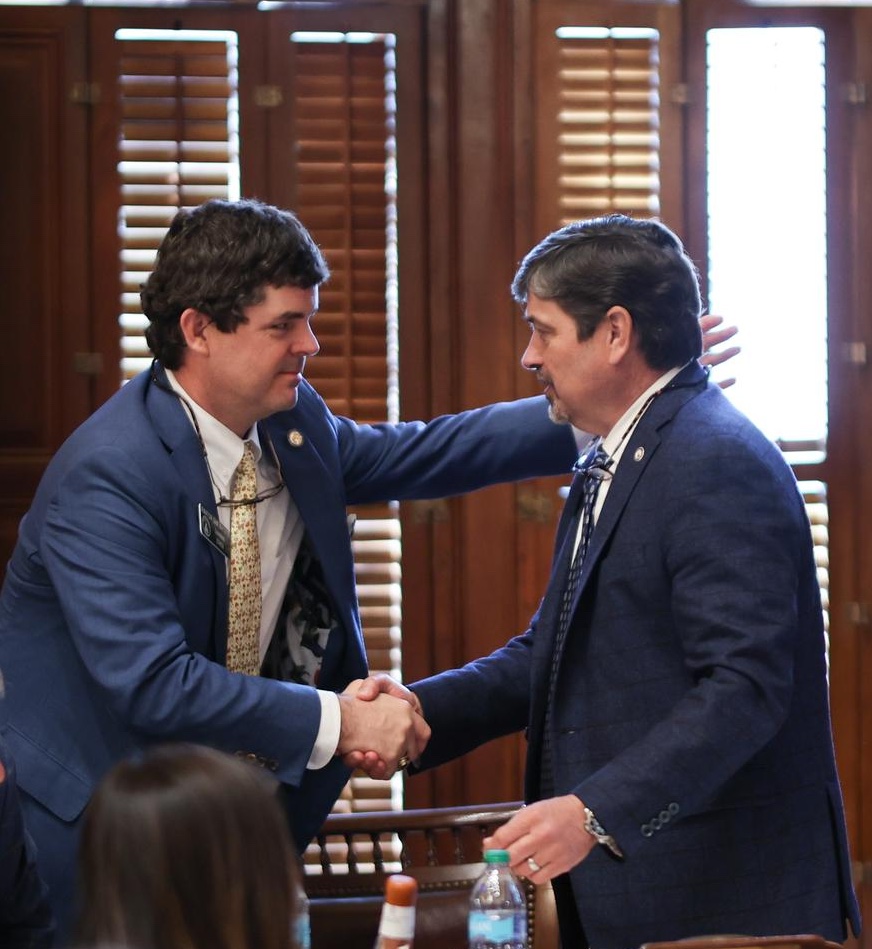
Sen. Sam Watson, left, & Rep. Steven Meeks worked to get crop protection bills passed./Photo courtesy of House Media Services.
Crop protection tools are among the most important tools farmers need to successfully grow their crops. SB 144 by Sen. Sam Watson recognizes compliance with the Environmental Protection Agency's labeling requirements under the Federal Insecticide, Fungicide, and Rodenticide Act (FIFRA), which is the national standard.
By aligning Georgia law with FIFRA, this bill ensures that pesticide policies are grounded in rigorous scientific evaluation rather than political narratives. This bill protects farmers’ access to critical crop production tools by reinforcing that manufacturers fulfill their legal responsibilities if they comply with EPA's labeling requirements for registered products.
New Extension positions
The University of Georgia Cooperative Extension provides a vital resource in fulfilling the university’s land grant mission. This year, GFB advocated that UGA receive funding for a North Georgia Hay & Forage Extension specialist and breeder technician positions for Georgia’s peach/citrus, blueberry and turfgrass crops.
Hay production happens statewide. Providing additional resources to this commodity will equip the current specialist to better serve farmers in South Georgia and allow UGA Extension to provide targeted service to North Georgia. All the new positions will provide cutting edge research, ensure new discoveries make their way back to Georgia farms and move UGA closer to being the top agriculture college in the nation.
GFB members make the difference
The success of this legislative session started with county Farm Bureau members being engaged and having solid relationships with their elected officials. Because of the strong, grassroots network our organization has across the state, GFB’s Public Policy Department is equipped to make a meaningful impact in Atlanta.
Thank you to all the members who traveled to Atlanta during the session to advocate for agriculture. In the months leading up to the 2026 Legislative Session, please take time to thank your legislators and state leaders for their support this year. If you don’t already know them, please take time to get to know your local delegation and inform them about the importance of agriculture in the communities they represent.
Adam Belflower is Georgia Farm Bureau’s state affairs manager. He may be reached at acbelflower@gfb.org or 478-474-0679, ext. 5239.
